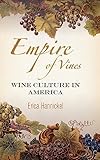Empire of Vines : Wine Culture in America / Erica Hannickel.
Material type: TextSeries: Nature and Culture in AmericaPublisher: Philadelphia : University of Pennsylvania Press, [2013]Copyright date: ©2014Description: 1 online resource (312 p.) : 40 illusContent type:
TextSeries: Nature and Culture in AmericaPublisher: Philadelphia : University of Pennsylvania Press, [2013]Copyright date: ©2014Description: 1 online resource (312 p.) : 40 illusContent type: - 9780812245592
- 9780812208900
- 663.20973
- TP557 -- H358 2013eb
- online - DeGruyter
- Issued also in print.
| Item type | Current library | Call number | URL | Status | Notes | Barcode | |
|---|---|---|---|---|---|---|---|
 eBook
eBook
|
Biblioteca "Angelicum" Pont. Univ. S.Tommaso d'Aquino Nuvola online | online - DeGruyter (Browse shelf(Opens below)) | Online access | Not for loan (Accesso limitato) | Accesso per gli utenti autorizzati / Access for authorized users | (dgr)9780812208900 |
Frontmatter -- Contents -- Introduction. Grape Culture, National Culture -- 1. Tributaries of the Grape -- 2. Propagating Empire -- 3. Landscapes of Fruit and Profit -- 4. Fear of Hybrid Grapes and Men -- 5. California Wine Meets Its "Destiny" -- 6. The Danger of a Vineyard Romance -- Epilogue. An Empire of Wine -- NOTES -- Bibliography -- Index -- Acknowledgments
restricted access online access with authorization star
http://purl.org/coar/access_right/c_16ec
The lush, sun-drenched vineyards of California evoke a romantic, agrarian image of winemaking, though in reality the industry reflects American agribusiness at its most successful. Nonetheless, as author Erica Hannickel shows, this fantasy is deeply rooted in the history of grape cultivation in America. Empire of Vines traces the development of wine culture as grape growing expanded from New York to the Midwest before gaining ascendancy in California-a progression that illustrates viticulture's centrality to the nineteenth-century American projects of national expansion and the formation of a national culture.Empire of Vines details the ways would-be gentleman farmers, ambitious speculators, horticulturalists, and writers of all kinds deployed the animating myths of American wine culture, including the classical myth of Bacchus, the cult of terroir, and the fantasy of pastoral republicanism. Promoted by figures as varied as horticulturalist Andrew Jackson Downing, novelist Charles Chesnutt, railroad baron Leland Stanford, and Cincinnati land speculator Nicholas Longworth (known as the father of American wine), these myths naturalized claims to land for grape cultivation and legitimated national expansion. Vineyards were simultaneously lush and controlled, bearing fruit at once culturally refined and naturally robust, laying claim to both earthy authenticity and social pedigree. The history of wine culture thus reveals nineteenth-century Americans' fascination with the relationship between nature and culture.
Issued also in print.
Mode of access: Internet via World Wide Web.
In English.
Description based on online resource; title from PDF title page (publisher's Web site, viewed 30. Aug 2021)


